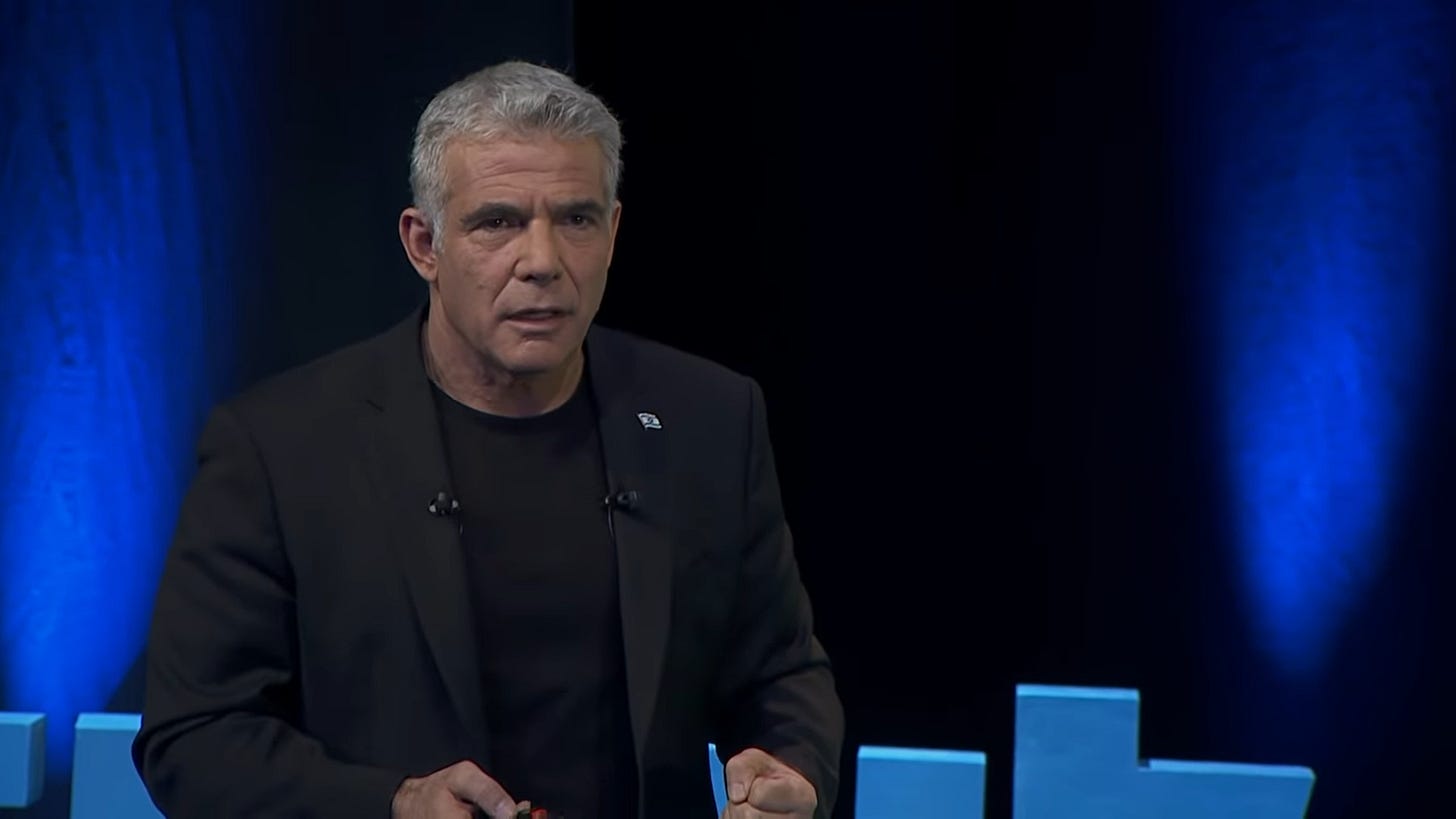My interview with new Israeli Opposition Leader Yair Lapid
Plus: In the Washington Post, I write about why Twitter fact-checking Trump won't solve the platform's problems

This past week, I spoke with Israel’s new opposition leader Yair Lapid, in what was his first live on-camera English interview since assuming the post. We tackled every hot button topic imaginable—from Benjamin Netanyahu’s trial, to the future of Arab-Jewish partnership in Israeli politics, to West Bank annexation, to how Lapid discovered non-Orthodox Judaism—and much more. You can check it out in the medium of your choice: The video of our conversation can be viewed here, while the full transcript is available for reading and printing in Tablet here.
Among the many things that struck me in the interview was Lapid’s very different understanding of how people work and how politicians should serve them. He’s an avowed centrist, but to him, this doesn’t mean simply squaring the difference between two sides. It means recognizing that most people hold a complicated mix of commitments and that a politician’s job is to negotiate and balance those commitments—for example, liberalism and nationalism—within a society. We need fewer “theories,” he told me, and more leaders who understand a country “more as a managed conflict and less as a battle between two sides that want to kill each other.”
To Lapid, places like cable news and Twitter, dominated by partisans and people paid to have strident ideological positions, don’t reflect how most people live their lives. “It is not authentic to be an extremist,” he told me. He has premised his political career on that assumption, and despite innumerable naysayers, it has been quite a successful one.
Read our complete conversation here.
Why Fact-Checking Trump’s Tweets Won’t Solve Twitter’s Problem
Moving on to a very different style of political discourse, I wrote about Twitter’s latest attempt to mollify its critics, this time by slapping a fact-check on one of Donald Trump’s tweets. In the Washington Post, I explain why this short-term solution actually exacerbates Twitter’s long-term problem, and offer a better approach that the company could pursue:
Twitter’s problem is partly about public relations. The company would like to distance itself from what malicious users do on its platform. (It’s the only major tech company that more people view negatively than positively.) But fact-checking one or more of Trump’s tweets won’t resolve this predicament — it just draws more attention to the president’s use of Twitter to spread untruths. And it sets a precedent that the company may regret. From this point forward, critics will demand similar fact-checks of every unhinged presidential proclamation, as well as of countless tweets by other bad actors that fall afoul of the standard the company has now seemingly set.
Policing those tweets would keep Twitter quite busy. The Chinese Communist Party’s top officials, for example, have been running a shameless campaign on the site to falsely suggest that the coronavirus originated in the United States. Don’t these lies about the defining crisis of our time — coming from major political figures in one of the world’s most powerful countries — also demand a fact check?
Just last week, the Supreme Leader of Iran went on one of his bizarre periodic rants about Israel (or as he calls it, the “cancerous tumor”). Is Twitter going to fact-check his claim that the home of half the world’s Jews is a malignant growth that must be excised — or is incitement to genocide of less concern than Trump’s false assertions about voter fraud?
…Simply put, unless Twitter wants to commit itself to being the fact-checkers of the president, the Chinese regime, the Iranian theocracy and the world’s most prominent conspiracy theorists, the company will continue to be blamed for the misinformation that circulates on their platform — and have now only deepened the perception that they are accountable for all of it.
…Twitter is neither qualified nor capable of deciding which content on its platform deserves correction, and its inevitably patchwork approach will just fuel the victim complex of those it does correct, and make Twitter appear selective and partisan.
There is, however, another way.
My goal is to help as many people as possible understand some of today’s most vexing subjects in plain English and without condescension. If you want to support this sort of journalism, please be sure to subscribe to get future installments directly in your inbox, and tell your friends about the newsletter.

